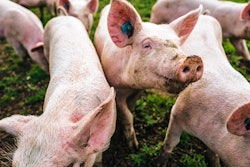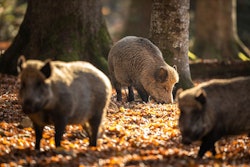
With ASF ‘dangerously close to our shores,’ APHIS is preparing to protect its pig herd.
The United States Department of Agriculture (USDA) Animal and Plant Health Inspection Service (APHIS) highlighted ways it was looking to combat a potential outbreak of African swine fever (ASF).
During the House Agriculture Committee’s Subcommittee on Livestock, Dairy and Poultry hearing, “A Review of USDA Animal Disease and Response Efforts,” held April 18, USDA Marketing and Regulatory Programs Under Secretary Jenny Moffitt, and APHIS Veterinary Services Associate Deputy Administrator Alecia Naugle, fielded questions from subcommittee members about preparedness strategies.
The hearing was held in advance of negotiations for the upcoming farm bill, and Subcommittee Chairman Tracey Mann, R-Kansas, stressed the need that APHIS be properly funded to fight such animal diseases as he opened the hearing.
“Today’s hearing is particularly timely as we’re in the middle of the most devastating highly pathogenic avian influenza (HPAI) outbreak on record and African swine fever (ASF) in the Dominican Republic and Haiti is dangerously close to our shores,” Mann said.
“The new farm bill must continue to address these risks to animal health while bolstering a long-term ability for U.S. animal agriculture to be competitive in a global marketplace and provide consumers around the world, safe, wholesome affordable food produced in a sustainable manner.”
Vaccination strategy
Rep. Don Bacon, R-Nebraska, expressed his pleasure with how, during the 2018 Farm Bill, Congress was able to get funding for an animal disease vaccine bank, which he said would be a good tool to help Nebraska cattle and pork producers protect their herds from a potential outbreak of foot-and-mouth disease (FMD).
Bacon asked the two USDA leaders at the hearing if they felt the vaccine bank was fully operational, and while Moffitt said there are always ways that such a vaccine bank could be more thoroughly prepared, it is certainly helpful. Moffitt said while the best way to battle animal diseases is through biosecurity, the vaccine bank is a “good insurance policy.”
Naugle elaborated on the stock of the vaccine bank, saying it gives APHIS access to the vaccine antigen concentrate for FMD, and access to a finished vaccine for classical swine fever (CSF), and diagnostic test kits for FMD and ASF.
“If we need to deploy vaccination tomorrow, we would have access to FMD and CSF vaccine,” Naugle said.
When Bacon asked further about the status of a potential ASF vaccination situation, Moffitt told of recent efforts.
“I had the opportunity to travel to Vietnam where (USDA Agricultural Research Service), in partnership with the Vietnamese government, is working on African swine fever vaccine trials for a handful of different vaccine strains,” Moffitt said.
She added that just like the USDA is doing as it looks at avian influenza vaccination option, it is looking on how vaccines should be developed, and part of the approval process would include consideration of factors such as impacts on human and animal health, the efficacy of the vaccine, and how the U.S. could maintain and evaluate trade if vaccines were used.
Bacon explained how devastating ASF was to the Chinese pork industry, and how he is glad the U.S. is “ahead of the game here and (has) some preventative measures and reactionary measures if it happens.” He then asked if USDA had adequate research funds to do what needed to be done.”
Moffit said the agency would do what it could with the funding allocated, and pointed out that partnerships with the pork industry and universities can help maximize what they can do with the funding available.
Depopulation and disposal
Rep. Randy Feenstra, R-Iowa, comes from a state that is a top pork producer and a top egg producer. He spoke of how Iowa producers have had to depopulate their flocks because of HPAI infections.
And while he says he “surely” doesn’t want an ASF outbreak to occur in the U.S., he wants to make sure that APHIS is prepared if it does, and part of that preparedness is knowing how to handle hogs that have been depopulated due to ASF.
“Depopulation of birds is one thing, but when you have to euthanize hogs, it’s another thing,” he said, recalling how hog herds already had to be depopulated during the height of the COVID-19 pandemic because of a lack of available processing capacity due to a high number of sick workers.
Feenstra said he knows simply burying ASF-infected pigs isn’t an option because the virus would remain, so he wanted to know how much thought has been given to pig carcass disposal.
Moffit said APHIS has “absolutely been preparing for the – I hope – unlikely event of African swine fever in the country.”
She said USDA has been investing funds authorized for dealing with ASF8 and has looked at “different mechanisms and rapid response so we understand how to do disposal.”
As Feenstra began to ask for her to elaborate, he realized that his allotted time on the floor had expired, and he had to yield back to Mann to call on the next speaker. However, he asked Moffitt to submit more information to him in writing, to which she said she would.


















